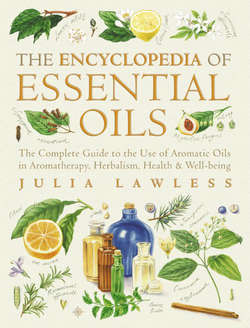Читать книгу Encyclopedia of Essential Oils: The complete guide to the use of aromatic oils in aromatherapy, herbalism, health and well-being. - Julia Lawless - Страница 20
The Genito-urinary and Endocrine Systems
ОглавлениеLike the digestive system, the reproductive organs can be affected by absorption via the skin into the bloodstream, as well as through hormonal changes. Some essential oils such as rose and jasmine have an affinity for the reproductive system having a general strengthening effect as well as helping to combat specific complaints like menstrual problems, genital infections and sexual difficulties. Other oils contain plant hormones which mimic the corresponding human hormones; oils such as hops, sage and fennel have been found to contain a form of oestrogen that influences the menstrual cycle, lactation and secondary sexual characteristics. Oestrogen also helps maintain a healthy circulation, good muscle and skin tone and strong bones in both men and women.
Other essential oils are known to influence the levels of hormone secretion of other glands, including the thyroid gland (which governs growth and metabolism), the adrenal medulla (which deals with stress reactions) and the adrenal cortex (which governs several processes including the production of oestrogen and androgen, the male sex hormone).
Antispasmodics for menstrual cramp (dysmenorrhoea), labour pains, etc; for example, sweet marjoram, chamomile, clary sage, jasmine, lavender.
Emmenagogues for scanty periods, lack of periods (amenorrhoea), etc; for example, chamomile, fennel, hyssop, juniper, sweet marjoram, peppermint.
Uterine tonics and regulators for pregnancy, excess menstruation (menorrhagia), PMT, etc; for example, clary sage, jasmine, rose, myrrh, frankincense, Melissa.
Antiseptic and bactericidal agents for leucorrhoea, vaginal pruritis, thrush, etc; for example, bergamot, chamomile, myrrh, rose, tea tree.
Galactagogues for increasing milk flow; for example, fennel, jasmine, anise, lemongrass (sage, mint and parsley reduce it).
Aphrodisiacs for impotence and frigidity, etc; for example, black pepper, cardamon, clary sage, neroli, jasmine, rose, sandalwood, patchouli, ylang ylang.
Anaphrodisiacs for reducing sexual desire; for example, sweet marjoram, camphor.
Adrenal stimulants for anxiety, stress-related conditions, etc; for example, basil, geranium, rosemary, borneol, sage, pine, savory.
With regard to the kidneys, bladder and urinary system in general, it is difficult to bring about results simply by using essential oils. According to recent research, ‘the diuretic effects of essential oils are virtually nonexistent’.11 In addition, the traditional diuretic agents such as juniper, lovage and parsley seed are considered unsuitable as essential oils for internal use due to toxicity levels and possible kidney damage; herb teas of fennel, dandelion or chamomile provide a milder alternative. Bathing and using a douche can help control urinary infections, especially when they are associated with nervous or stress-related symptoms.
Urinary antiseptics for cystitis, urethritis, etc; for example, bergamot, chamomile, tea tree, sandalwood.
‘Lerne the hygh and mervelous vertue of herbes … use the effectes with reverence, and give thankes to the maker celestyall’; from Braunsweig’s The Vertuose Bake of Distyllacyon of the Waters of all Maner of Herbes, 1527
